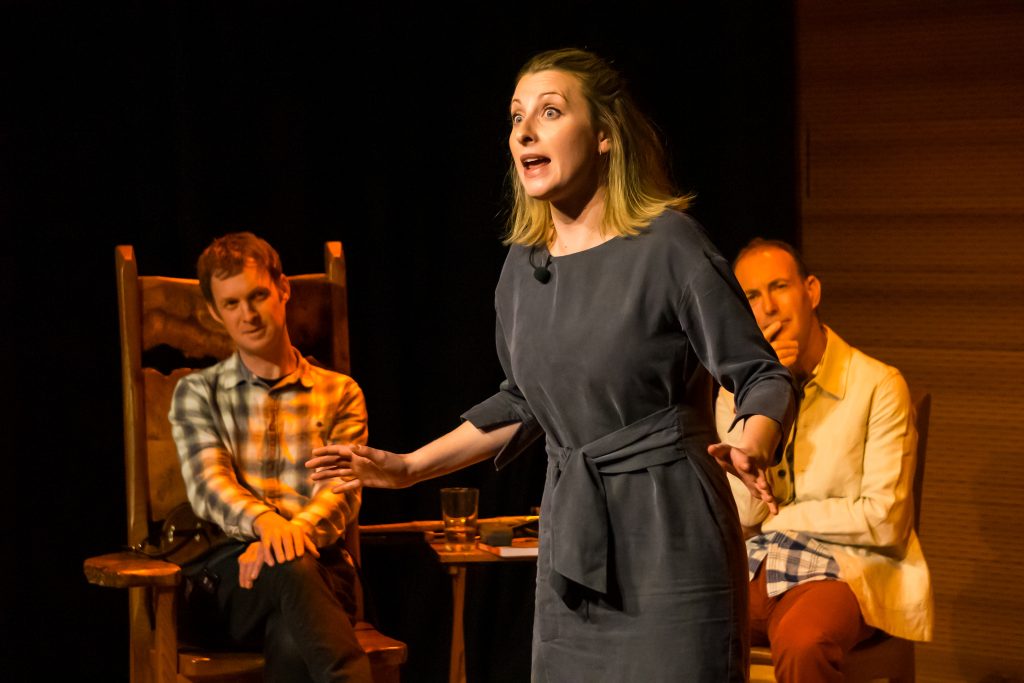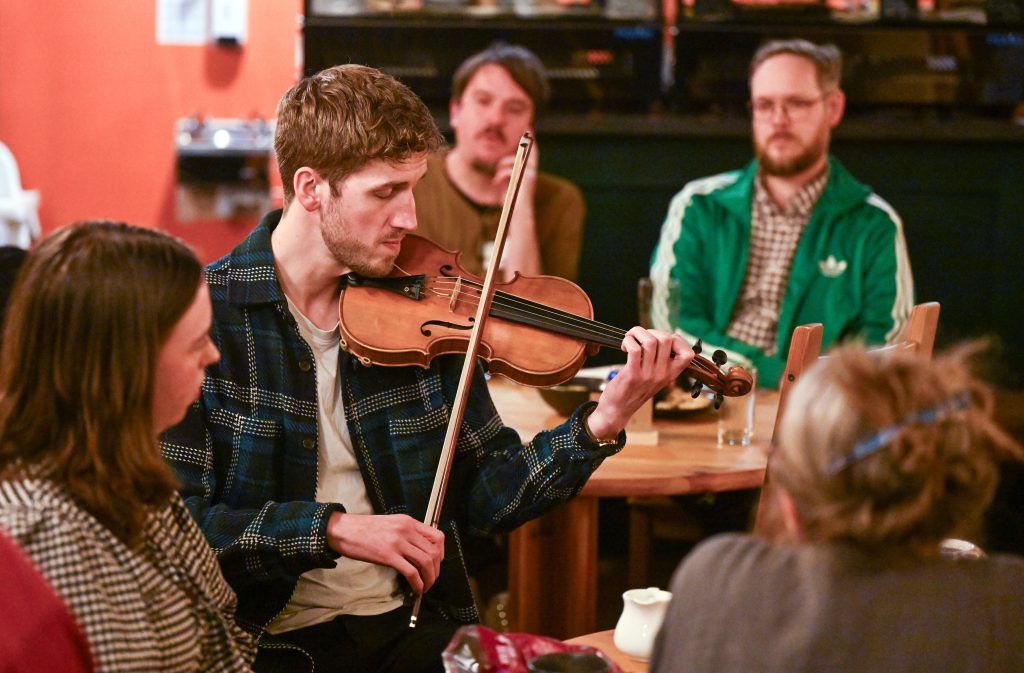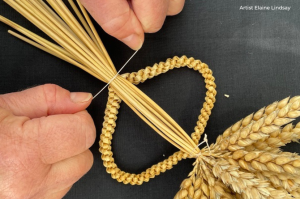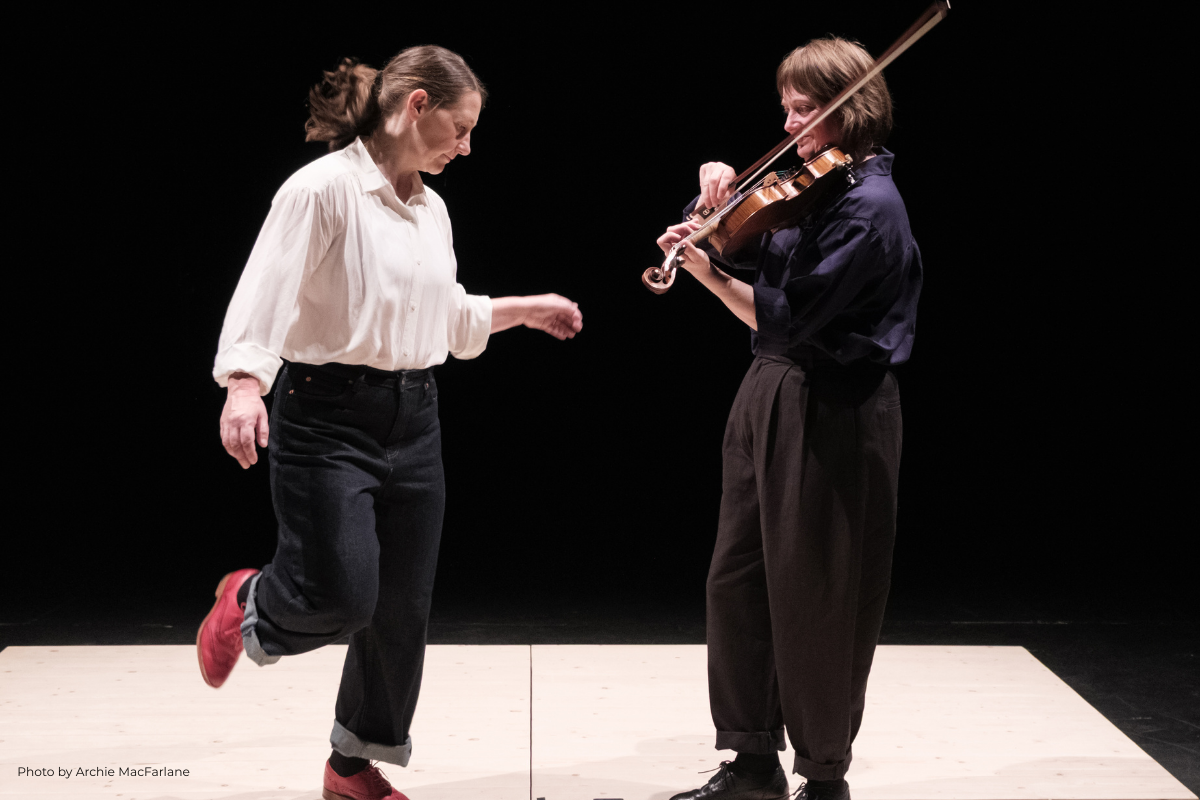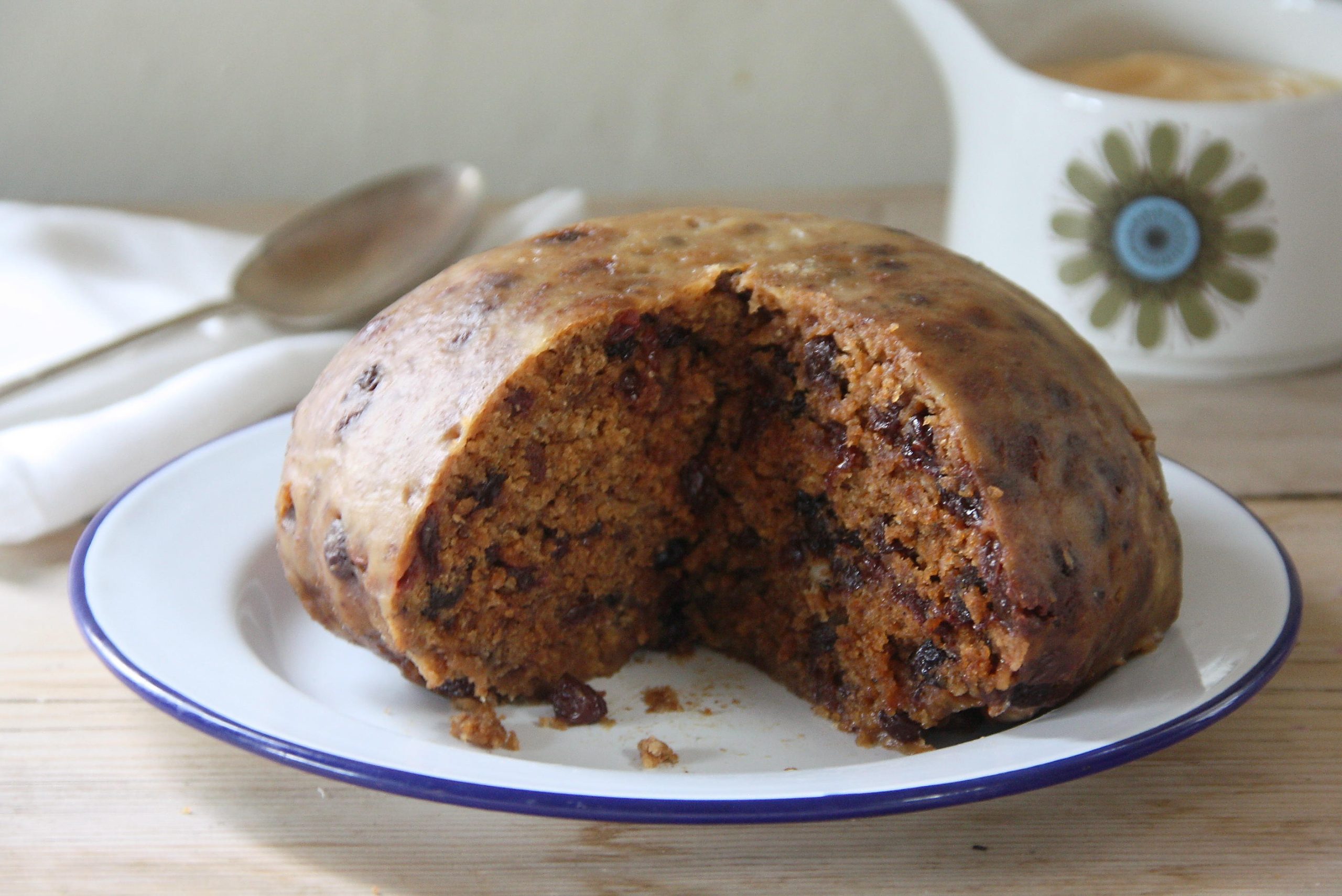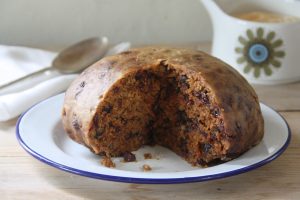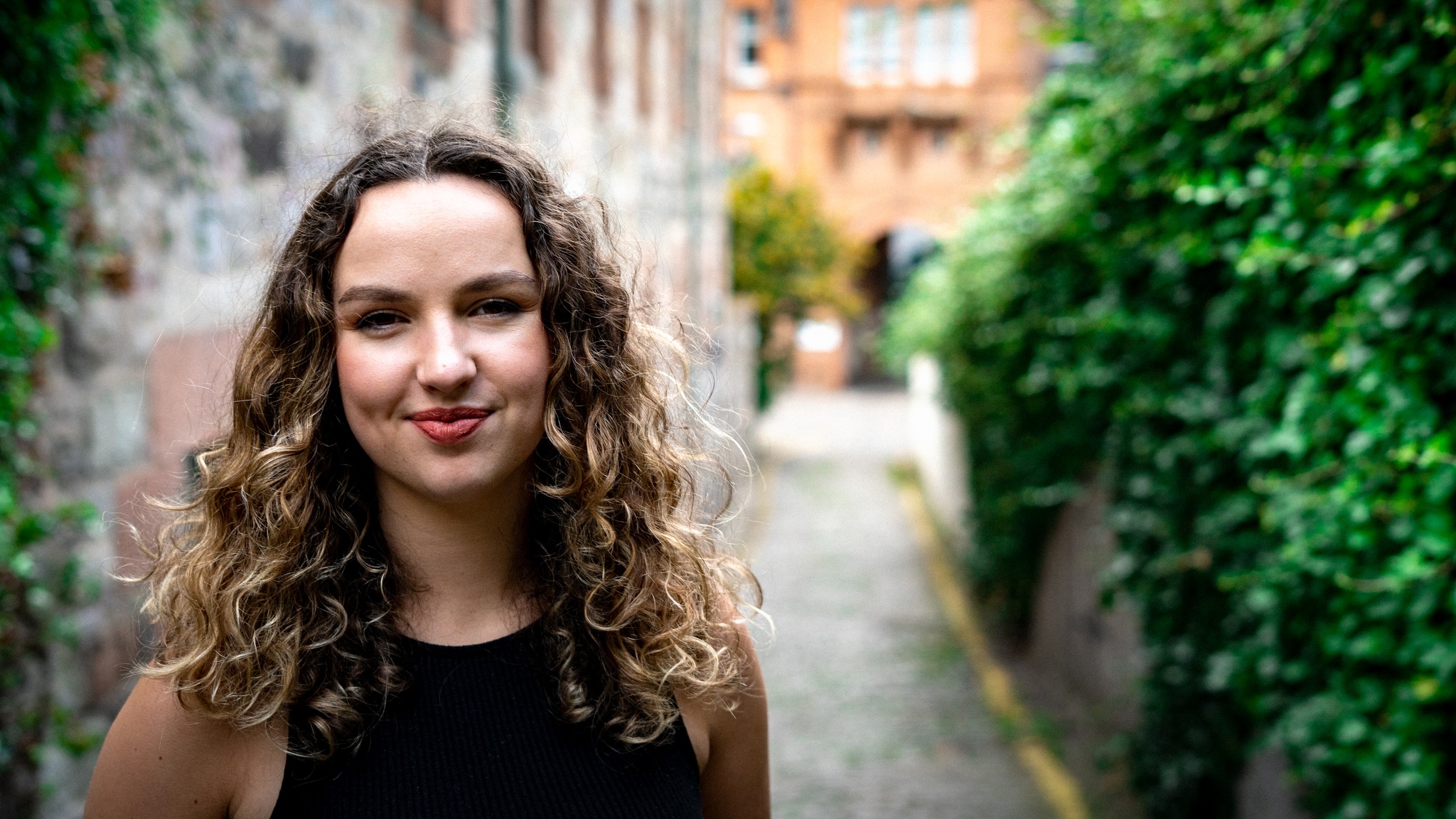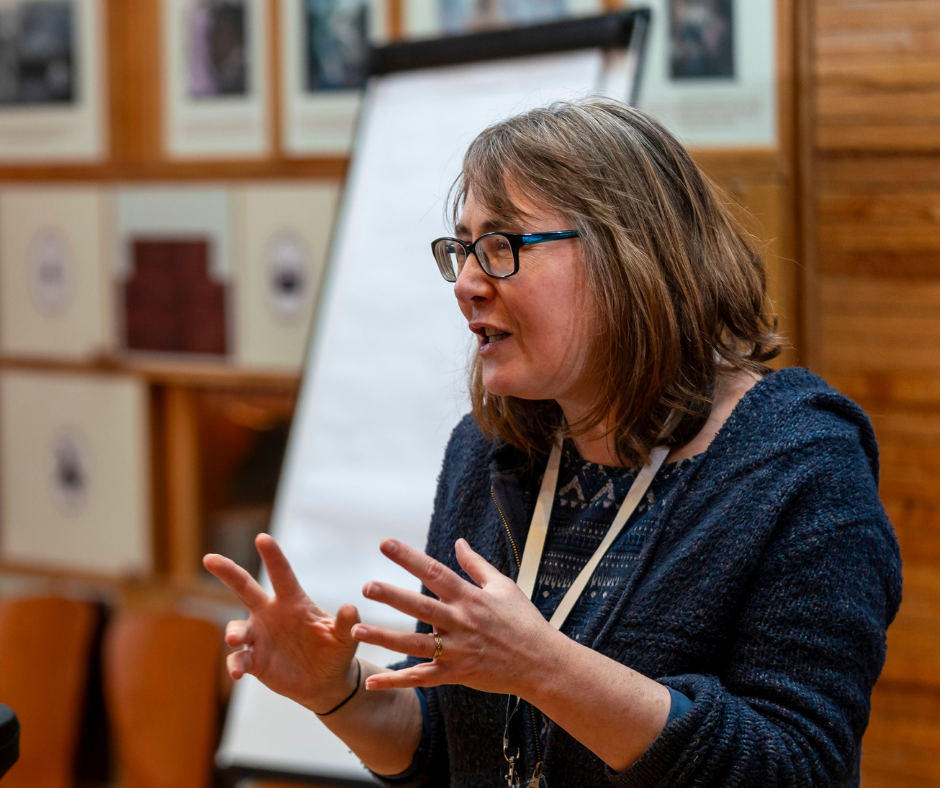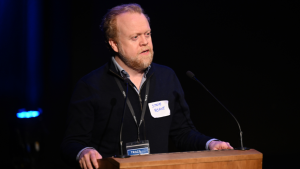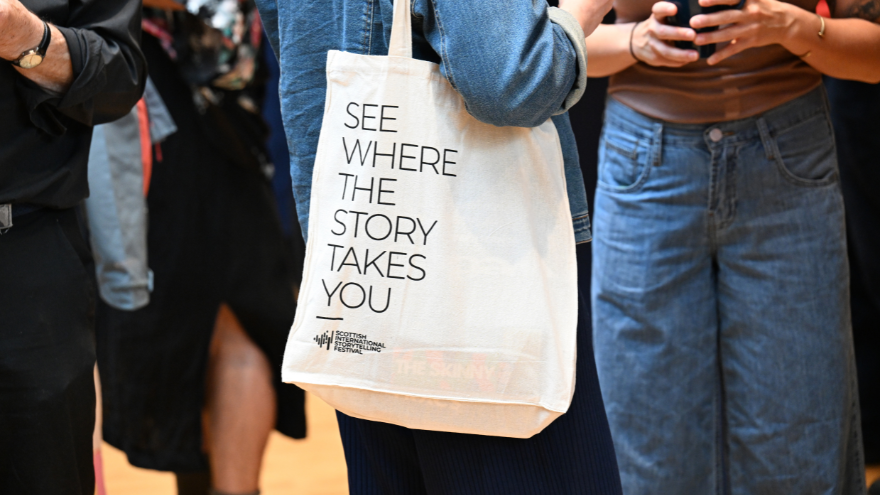It’s always hard to know where to start a story. So we thought we’d start this blog with a wee description of a scene from our new show Deiseil: Dancing in Time, which we hope captures some of the complexities and joys of being part of the revived tradition of stepdance in Scotland.
“Abair ach beagan ’s abair gu math e: say but little and say it well.”
As the words fade away, Alison steps forward onto the stage. Red shoes echo on the boards.
“Step by step, we continue the circle. Uncover the past, dig for clues in the old songs. Chluinnte faram am bròg, the shoes could be heard, they danced on the floor.”
Amy is on her feet now too, and we circle each other as we walk. It is August, hot, an unseasonable Edinburgh summer. But those watching are hundreds of miles and hundreds of years away. They have been transported to a cold November afternoon in the Highlands: houses demolished, people shipped away to Canada, Gaelic songs dying on an icy wind.
“The sun rises and sets, and what goes around comes around again.”
Circling, circling. Going deiseil, the old Gaelic word for clockwise, or sunwise. A culture full of traditions held by the rhythms of the seasons and of the sun. The pattern mirroring the journey of the dance: exiled to Cape Breton, returned to Scotland.
“But we are changed, and the dance changes with us.”
The steps continue to rise and fall. The past hour has distilled not only centuries of tradition in music, dance and language, but also decades of friendship expressed in fiddle and feet. Sparking off each other, the tunes and steps in a fluid conversation, joyful and uplifting.
We stop. Turn. Face each other.
“Tha dannsa ceum beò.”
The cadence of Scottish Gaelic, a language almost silenced by years of oppression.
And then in English.
“Stepdance is alive.”
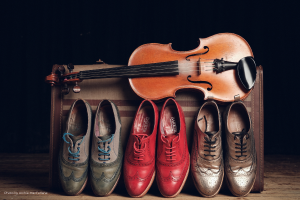
First steps
We first learned stepdance from Cape Breton dancers who came to Scotland to teach for a week every summer. There were a few different dancers over the years but the most influential on us were Harvey Beaton and Mary Janet MacDonald. They came to teach at the Sabhal Mòr Ostaig fiddle week established by Alasdair Fraser and the Ceòlas summer school established by Hamish Moore, joining great Cape Breton musicians, most notably Buddy MacMaster. It was the early 1990s and there was so much excitement about this new – old! – way of dancing and playing. We learned strathspeys, reels and jigs from people who’d had these rhythms passed down to them through generations, since people had emigrated from the west of Scotland – many driven out during the Highland Clearances, others emigrating for economic reasons. The dance and the style of playing for it was kept alive in Cape Breton, an island in Nova Scotia, Canada. We are so grateful to those who held on to this tradition and who brought it back to us through their teaching. For us and others, learning stepdance unlocked a missing part of our culture and identity.
Alison grew up in the Highlands listening to Cape Breton music: her Dad had immediately felt an affinity between the percussive, energetic style and his own Gaelic heritage, and so there were always fiddle tunes filling the house and musicians calling in for house parties. Amy’s upbringing was in Galloway, where she learned fiddle by ear from older folk who still upheld the oral traditions. There were ceilidhs in the village hall where everyone would take a turn to play. But there was no stepdancing – Amy learned Highland dancing as a child but that wasn’t connected to the music she was learning.
We probably first met when we were both at Sabhal Mòr Ostaig learning from Buddy MacMaster and Harvey Beaton, but neither of us can remember it – the six year age gap that is nothing to us now was more significant when we were teenagers! Decades later, we have settled into our own style of playing and dancing. But the way that Buddy and Harvey emphasised how the music and dance were inseparable from each other remains a huge influence on us both.
Stepdance and its music
There’s a lot of fascinating research into the origins and evolution of stepdance as it passed between Scotland and Cape Breton and back which is beyond the scope of this article, so we’ll focus here on how we dance and play.
The essence of stepdance is creating rhythmic patterns which complement the music. Rather than fixed routines of steps, Alison chooses which step to dance from moment to moment through the tune. That is driven by the choices Amy is making – where and when to use different types of ornamentation and dynamics, how to keep the pulse steady whilst creating variety and interest – which in turn is driven by the steps Alison is dancing. It’s a conversation between us which is different every time. We love playing with the music and steps, making little musical jokes and surprising each other! And when we’re teaching together, we like to have the musicians and dancers in the same room so that everyone can understand how the whole works together.
Although the emphasis is on the rhythm, traditionally it’s also been important to have a neat style with small movements. But there’s no prescribed way you have to dance a step, since there are no competitions and no rules. This freedom feels really valuable to us.
It’s also creative as people are always making up new steps: different combinations of sounds to create something personal to the dancer. Steps are the vocabulary of stepdance and people are always keen to learn interesting new steps!
Puirt a beul (Gaelic for mouth music) are Gaelic songs for dancing to. The singing tradition survived in Scotland despite the loss of the steps, and since the revival of stepdance here these two parts of the tradition have found each other again. As highlighted in the extract from the show, stepdance is intrinsically linked with the cadences of Gaelic language. Although the huge resource of Gaelic songs and tunes here had lost stepdance as a continuing rhythmic influence, this is now being regained, and stepdance reinstated as part of Gaelic culture.
Passing it on
The fact that stepdance is a revived tradition in Scotland brings up some complex questions of identity and transmission. We’re in no doubt that in the 30 years or so since stepdance re-entered Scottish culture, there have been changes from how it is danced in Cape Breton. For example, because we already have ceilidhs as our informal social dancing, there hasn’t been much impetus for introducing the square dances which are how most people participate in stepdancing there. There are more people in Scotland who solo dance to jigs (which in Cape Breton are used in square dances), adapting reel steps to fit. Because there aren’t so many people who know how to play for stepdance, dancers have had to adapt to the music that’s available.
Some evolution may also be down to technological change. We learned at the end of centuries of oral tradition where dance was difficult to record and the only way to learn to dance or even to see any stepdancing was in person from another dancer, closely observing and remembering the steps. Now there are thousands of videos online and it’s easy to whip out a phone to capture a new step, and to connect with other dancers across the globe. Inevitably that changes how people learn and develop their dancing, perhaps combining stepdance with other percussive dance traditions, finding new rhythms or departing from the traditional style.
It’s really important to build good support networks for people involved in stepdance in Scotland, so we can continue to work collectively, share best practice and explore how stepdance can thrive. There are too many folk to mention here, but we are proud to be part of a community which has worked hard to put stepdance on a safe footing in Scotland.
We would love to see the links between Cape Breton and Scotland maintained and strengthened, continuing opportunities for people here to learn from Cape Breton dancers and musicians whilst still recognising that the Scottish context can be different.
Opportunities for musicians and singers to understand stepdance are essential to integrating the dance into the music, and building the links between Gaelic songs, tunes and steps.
Next steps
To us, the most important thing is that people are given the opportunity to participate in stepdance, to understand its story and to choose their own path – whether that’s dancing a few steps at home or at a ceilidh, playing music or singing for stepdance, getting up to dance at a session or progressing in performing or teaching.
We hope that stepdance can continue to grow within Scottish and Gaelic culture, and bring as much joy to others as it has to us.
Written by Alison Carlyle and Amy Geddes


